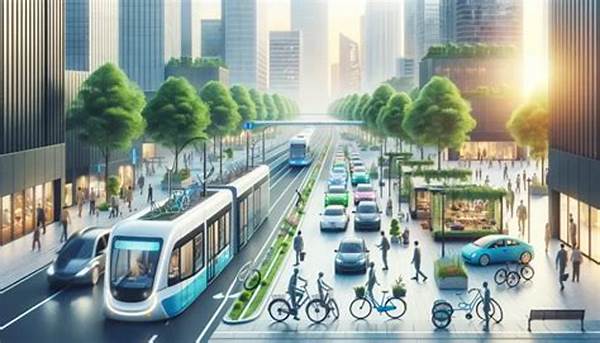In the hustle and bustle of modern urban life, we stand at a critical crossroads. Our choices today determine the quality of our tomorrow. The need for eco-friendly urban transportation systems has never been more urgent. With cities expanding and populations rising, sustainable solutions aren’t just a preference; they’re an absolute necessity. The adoption of green transportation isn’t merely about dodging traffic nightmares or looking trendy — it’s a commitment to our environment, our health, and our future.
Read Now : Organic Wall Paint Brands
Transforming Cities: The Impact of Eco-Friendly Urban Transportation Systems
Eco-friendly urban transportation systems can revolutionize our cities by reducing pollution, congestion, and noise. Imagine breathing cleaner air, with streets buzzing harmoniously with electric vehicles, bicycles, and efficient public transport. Such systems don’t only serve the environment; they offer healthier lifestyles and promote social equity, providing access to all socioeconomic classes. In fact, cities embracing these advancements report improvements in quality of life and significant economic savings. By investing in sustainable infrastructure today, we guarantee a brighter, healthier, and more equitable tomorrow.
For governments and citizens alike, adopting eco-friendly urban transportation systems offers numerous advantages. While environmental benefits are paramount, the economic incentives are equally compelling. There’s evidence of reduced healthcare costs due to improved air quality and less road accidents. Moreover, these systems foster new job opportunities in green technology sectors. From electric buses speeding smoothly through our streets to solar-powered bike lanes eking new paths, each component plays a vital role in transforming our urban landscapes for the better. As stewards of our cities, we must all advocate for this green shift.
However, the challenge lies not in recognizing the problem but in implementing solutions. Eco-friendly urban transportation systems demand coordination, cooperation, and dedication from all stakeholders. Investment in research, incentives for clean technology, and commitment to long-term planning are vital. Encouragingly, leading cities demonstrate the possibilities: Paris’s commitment to cycling lanes and Copenhagen’s conversion to a cyclist’s haven exemplify decisions steering towards progress. Thus, as urban dwellers, our collective action can turn these visions into global standards. It’s time to unite and push for the positive transformations of our cities through sustainable transport.
Benefits of Eco-Friendly Urban Transportation Systems
1. Health Improvement: Eco-friendly urban transportation systems decrease air pollution, leading to better respiratory health, reducing public health expenses.
2. Environment Preservation: They help reduce greenhouse gas emissions, fighting climate change and preserving our planet for future generations.
3. Economic Savings: Transitioning to sustainable transport conserves energy and reduces vehicular wear and tear, saving city budgets over time.
4. Increased Accessibility: Developing comprehensive systems ensures transport equity, granting mobility to individuals from all walks of life.
5. Enhanced Quality of Life: Such systems alleviate traffic congestion, cutting commute times, and contributing to less stressed, more productive citizens.
Challenges and Opportunities in Adopting Eco-Friendly Urban Transportation Systems
Embracing eco-friendly urban transportation systems is not without its hurdles. However, the rewards for overcoming these challenges are immense. One prominent barrier is the initial infrastructure cost. Establishing a network that supports electric vehicles, constructing extensive cycling lanes, and enhancing public transit requires substantial investment. Yet, this upfront cost soon turns into long-term savings and positive returns.
Additionally, there’s a need for behavioral shifts among the public. Encouraging individuals to leave personal gas-powered vehicles for shared or public transport options demands changes in mindset. This endeavor involves comprehensive education campaigns emphasizing the tangible benefits of eco-friendly urban transportation systems. There are ample opportunities to engage communities and ignite a collective enthusiasm for sustainable practices. By promoting a culture of sustainability, cities can inspire citizens to become active participants in this transformative journey.
Innovations Driving Eco-Friendly Urban Transportation Systems Forward
Eco-friendly urban transportation systems thrive when powered by innovation. Electric buses and cars are becoming standard fixtures in progressive cities, revolutionizing how we transit. Additionally, the integration of technology with transport — such as smart traffic lights, real-time public transport apps, and e-bike sharing systems — contribute immensely to seamless travel experiences. These advances ensure that sustainable travel isn’t just viable but genuinely desirable.
Read Now : Interior Design With Shapes
Autonomous vehicles represent another leap forward in this realm, poised to redefine urban commuting with increased safety and efficiency. Meanwhile, renewable energy sources such as solar-powered charging stations are gaining traction, supporting the infrastructure that eco-friendly urban transportation systems require. With each inventive solution, the possibility of fully sustainable cities draws nearer. Investing in and supporting these technologies today is an investment in a prosperous, healthier urban future.
Building a Sustainable Future with Eco-Friendly Urban Transportation Systems
Eco-friendly urban transportation systems are the cornerstone of sustainable urban development. As cities face increasing environmental challenges, the implementation of green transportation initiatives is crucial. By significantly lowering carbon footprints, these systems help combat climate change while fostering healthier urban populations. In the pursuit of sustainability, cities must prioritize investment in infrastructures such as electric public transit, bicycle lanes, and pedestrian-friendly pathways.
The transition to eco-friendly urban transportation systems reflects a comprehensive strategy to enhance urban living standards. By improving accessibility and reducing congestion, these systems encourage more inclusive, healthier cities. Effectively integrating green technologies and policies into urban planning does not only yield environmental benefits but also enhances economic performance. As cities commit to sustainable practices, they inspire a ripple effect, advocating globally for a greener planet.
The Role of Policy in Advancing Eco-Friendly Urban Transportation Systems
Government policy plays a pivotal role in advancing eco-friendly urban transportation systems. By implementing regulations and providing subsidies, governments can accelerate the adoption of green technologies. Policies that incentivize electric vehicles, invest in public transportation, and support infrastructure development signify a commitment to sustainability. This involvement is critical to ensuring widespread access to these transformative systems.
Moreover, policy initiatives must emphasize public awareness and education. Encouraging shifts in commuter behavior requires informing city inhabitants about the personal benefits of eco-friendly urban transportation systems. When individuals recognize the positive health, environmental, and economic impacts, they become allies in the pursuit of sustainable living. Thus, embracing a policy framework that supports a collaborative approach between government, business, and the public is essential to achieving comprehensive, lasting change.
A Compelling Argument for Eco-Friendly Urban Transportation Systems
The compelling case for eco-friendly urban transportation systems rests on their profound capacity to effect change. They are indispensable solutions to the dual challenges of environmental degradation and urban overpopulation. By replacing fossil fuel-dependent transit modes with sustainable alternatives, cities reduce their carbon footprint, thus playing a crucial role in combating climate change. Moreover, cleaner air, reduced noise pollution, and improved public health outcomes underscore the multifaceted benefits of these systems.
Economically, the adoption of green transport methods fosters innovation, fuelling job creation in burgeoning sectors like renewable energy and electric vehicle manufacturing. Additionally, these systems promote social inclusion, ensuring equitable access to public transit, which is vital for urban socio-economic development. Consequently, investing in eco-friendly urban transportation systems is more than advantageous; it is essential for future-proofing our cities. By advocating for this transition, stakeholders champion a vision of vibrant, sustainable urban environments that promise myriad benefits for all.
Through strategic action, collective commitment, and sustained investment in eco-friendly urban transportation systems, we have the potential to transform urban living. Embracing this path is not just an option but a necessity to secure a sustainable, equitable future for generations to come.





